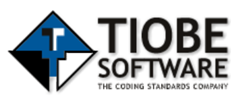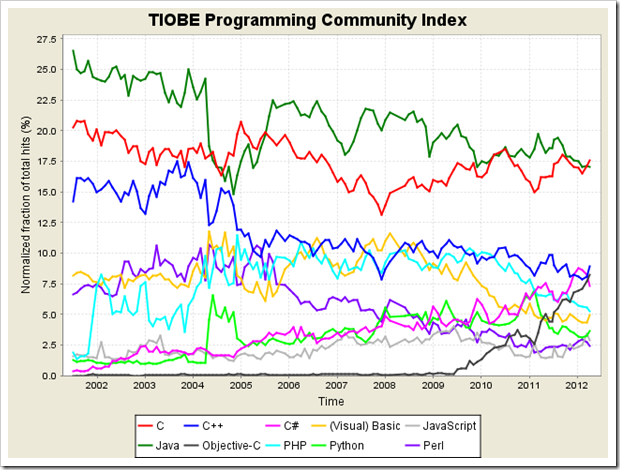
TIOBE Software has maintained a Programming Community Index for more than 10 years. Updated on a monthly basis, it is an indicator of the popularity of programming languages in use around the world. The ratings are based on the number of skilled engineers, courses, seminars, and third party vendors actively using the various technologies determined primarily through search engines such as Google, Bing, Yahoo!, Wikipedia, Amazon, YouTube and Baidu.
The April 2012 edition was recently released and highlighted some interesting market trends…

From a position of strength at the turn of the century, Java usage has been in a steady state of decline for the past decade. This past month it actually lost its top ranking and fell below the popularity line for the C programming language ( which has maintained a relatively stable state in recent years ). There are obviously numerous reasons for Java’s fall from grace but the acquisition of Sun Microsystems by Oracle in late 2009 has certainly not helped reverse its fortunes.
Interestingly, PHP usage has also been declining according to TIOBE, with usage peaking at 10% between the years 2005-2010 and experiencing a steady decrease in the years since, to ~5% today. Ironically, this has happened despite the strong growth of LAMP CMS systems like Wordpress, Drupal, and Joomla! in recent years. Perhaps customers have realized that PHP is still not capable of living up to the business challenges in mid-market and enterprise environments, and are looking elsewhere for tools they can depend on.
The largest beneficiary of the decline in Java and PHP usage appears to be Microsoft’s .NET platform. In particular, usage of Microsoft’s C# programming language has been steadily increasing since it was introduced in 2002 and may soon achieve 10% market share. Combine that with usage of Visual Basic and you will notice that usage of Microsoft technology is near 15% worldwide ( nearly twice the adoption of PHP ), and is one of the few development platforms experiencing steady year over year growth. I believe this speaks to the proven reliability and enterprise capabilities of .NET, as well as Microsoft's ongoing commitment to maintain the relevance of its technology stack.
Based on the graph, it is also interesting to note that C# usage surpassed Visual Basic usage in late 2010, which coincidentally was the exact same time that DotNetNuke Corporation announced that it was going to migrate its core framework from VB to C#.